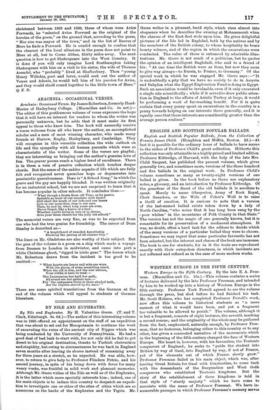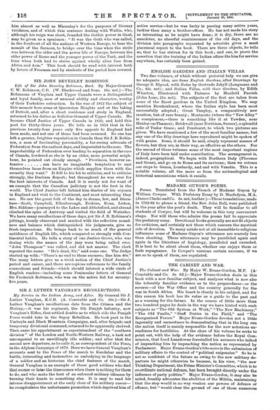Western Europe in the Fifth Century. By the late E.
A. Free- man. (Macmillan and Co. 10s.)—This volume contains a series of lectures delivered by the late Professor Freeman, and intended by him to be worked up into a history of Western Europe in the fifth century. Professor York Powell agreed to see the volume through the press, but died before he had finished his task. Mr. Scott Holmes, who has completed Professor Powell's work, now offers this volume to historical students as " a mere earnest of what it would have been, and yet a fragment too valuable to be allowed to perish." The volume, although it is but a fragment, consists of eight lectures, the seventh marking a second course ; and the originality of the whole may be gathered from the fact, emphasised, naturally enough, by Professor Free- man, that no historian, belonging either to this country or to any other, has given a connected narrative of the movements which in the beginning of the fifth century changed the face of Western Europe. His heart is, however, with his favourites, the Teutonic conquerors of England; he seeks to "guide the student into Britain by way of Gaul, into England by way, if not of France, yet of the elements out of which France slowly grew." Professor Freeman failed in his main object, which was, after leaving Great Britain for Gaul with Constantine, to come back with the descendants of the Burgundian and West Goth conquerors who established Teutonic kingdoms. But the story of the establishment of these kingdoms is told in that style of " sturdy majesty " which we have come to associate with the name of Professor Freeman. We have in- numerable passages in which Professor Freeman's memory serves
him almost as well as Mizcaulay's for the purposes of literary vividness, and of which this sentence dealing with Wallis, who, although his reign was short, founded the Gothic power in Gaul, may be given as a specimen : " It was the Goth who was called, in the forefront of all the nations of Western Europe, to bear the assault of the Saracen, to bridge over the time when the strife was between the older and the newer life of Europe, between the elder power of Rome and the younger power of the Turk, and the time when both had to strive against wholly alien foes from Africa and Asia." This book should be read with interest both by lovers of Freeman and by students of the period here covered.























































 Previous page
Previous page